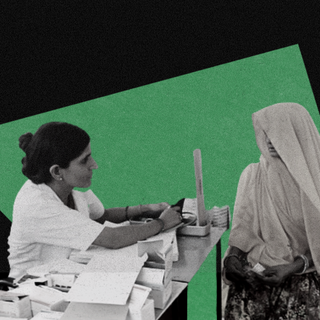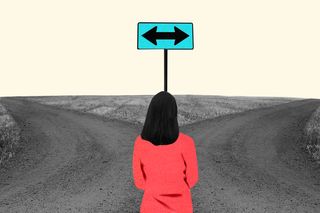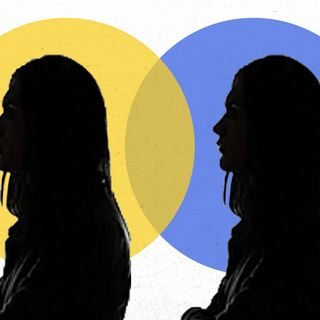
What Makes Us Trust Our ‘Gut Instincts’
With more experience and information, our brains learn to provide more ‘accurate’ gut responses.

In 2009, the Black Eyed Peas had a feeling.
They believed “that tonight’s going to be a good night.” Woooo hoooo.
The idea of trusting instinct, of listening to a “gut feeling” finds many takers in songs, movies, and life. “Listen to your gut,” “go with your gut,” “I feel it in my bones” are just some regular catchphrases you hear when a decision is around the corner. This feeling is, perhaps, best characterized as a “deep knowing,” which doesn’t need conscious decision-making.
Biologically, the ability to trust gut instincts is understood in two ways. One is related to brain processes where our mind evaluates and decodes non-verbal clues throughout the day. This sensory data is stored in the brain, even if we may not realize the minor observations or their meaning. Any decision in real-time is made based on these inputs.
The second is what scientists call the “predictive processing framework.” Think of the brain as an advanced information processing machine that constantly compares new sensory information with stored knowledge and memories of previous experiences. This helps the brain predict what will come next, and even help prepare to deal with situations as efficiently as possible.
Intuition, in particular, occurs when the brain makes a match or mismatch (between the current experience and stored information), but this information has not reached conscious awareness yet. So imagine that someone’s contemplating breaking up with a romantic partner. They decide to call it quits because their gut told them to. In reality, they were subconsciously picking up on signs of unfavorable behavior. In another instance, say, someone skips a dinner plan at a popular restaurant because something tells them not to go. Say those who did go, ended up with food poisoning. It is then that the person who skipped the dinner remembers reading an article of the unsanitary practices involved in food preparation at the restaurant.
Our brain learns from the consequences of listening to instinct, helping us make our intuition more reliable. The brain essentially “matches” current information with those from memory. With time, the brain has a larger reservoir of information to match the current experience. Hence, the result is more reliable and learned. For example, in an organization, the gut instinct of the boss is likely to be more reliable than a fresher’s; it’s what pads decision making.
Scientists have also drawn evolutionary roots to intuition. In hunter-gatherers, the gut feeling to not eat the food they accumulate could speak to the benefits of rationing energy and food supplies.
Despite the name, “gut feeling” does not originate from the gut. “The gut-brain connection makes it possible for emotional experiences to register as gastrointestinal distress. When you feel anxious, fearful, or certain that something’s wrong, you might experience stomach twinges, pain, or nausea. That’s where the name ‘gut feeling’ comes from,” Healthline noted.
Related on The Swaddle:
Should You Go With Your Gut Instinct? Science Suggests Yes
The question of relying on one’s instincts is among the most disputed. A gut feeling is thought to be fast, spontaneous, even whimsical. The reliance on past memories and experiences also makes it an “emotional” response. Researchers have posited intuition as antithetical to analytical thinking. The latter is envisioned as more logical, deliberate, and slow. Say, there is a Plan A and Plan B at work. Someone who defends Plan A with logical reasoning will have better chances of emerging as a winner against someone who defends Plan B with an “I have a feeling this will work better”.
“Gradually, many have come to think that humans have progressed from relying on primitive, magical, and religious thinking to analytic and scientific thinking. As a result, they view emotions and intuition as fallible, even whimsical, tools,” Valerie van Mulukom, a research associate of psychology at Coventry University, noted in The Conversation.
But relying on one’s instincts isn’t always a whimsical decision. It helps decision-making, even builds self-confidence. In other cases where people overthink or spend a lot of time balancing the pros and cons, studies have noted it hinders the decision-making process. “It is time to see it for what it is: a fast, automatic, subconscious processing style that can provide us with very useful information that deliberate analyzing can’t,” said Mulukom.
This binary view of “gut instincts” and “analytical thinking” may not hold ground in a realistic worldview. Emotions are not futile responses that contradict rational faculties. They are products of cognitive experiences and thoughts.
Some experts have noted that reasoning and instinct work in synthesis more often than we realize. According to a study in 2015, researchers found intuitive and analytical thinking are not mutually exclusive and often happen at the same time. Analytical thinking also involves rationalizing a decision or offering justifications for a view. For instance, people explain their decisions when in a dilemma (“why did you not raise your voice?”) by processing why their gut pointed them in a certain direction. Some experts thus also refer to deliberate thinking as the “inner lawyer” of intuition.
Of course, even intuition has its blind spots. The gut is not always fair or right and is shaped by one’s cognitive biases. An interviewee might pick a male employee over a female one, just because their gut tells them the male employee will be better. In instances like this, their “gut” has been fed on experiences or information of prejudice. These systemic errors in thinking often mask as “intuition” and doing what’s “right.” Familiarizing oneself with biases can help people spot them in the future.
It is futile to blame gut feeling as an illogical response. Pitting reason against intuition is a zero-sum game. The question should instead be how can people utilize both––their instinct and knowledge––to reach the best possible decision.
“Sometimes all the hard information we need is right there for us, and we can rely on logic without leaning too much on our gut instincts,” Geil Browning, a researcher of behavioral sciences, wrote in Inc. “But when it’s not, wouldn’t it be nice to know that our gut gives better than a 50/50 chance of success?”
Saumya Kalia is an Associate Editor at The Swaddle. Her journalism and writing explore issues of social justice, digital sub-cultures, media ecosystem, literature, and memory as they cut across socio-cultural periods. You can reach her at @Saumya_Kalia.
Related


One in Every Three Children in Delhi Has Impaired Lungs, Study Finds
